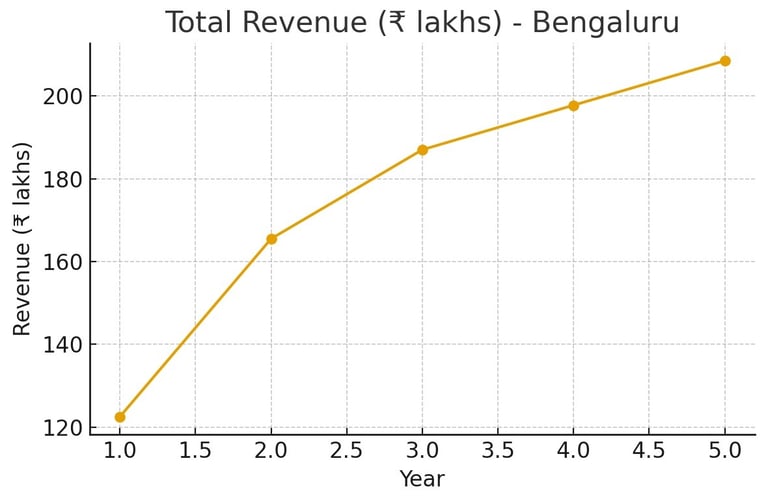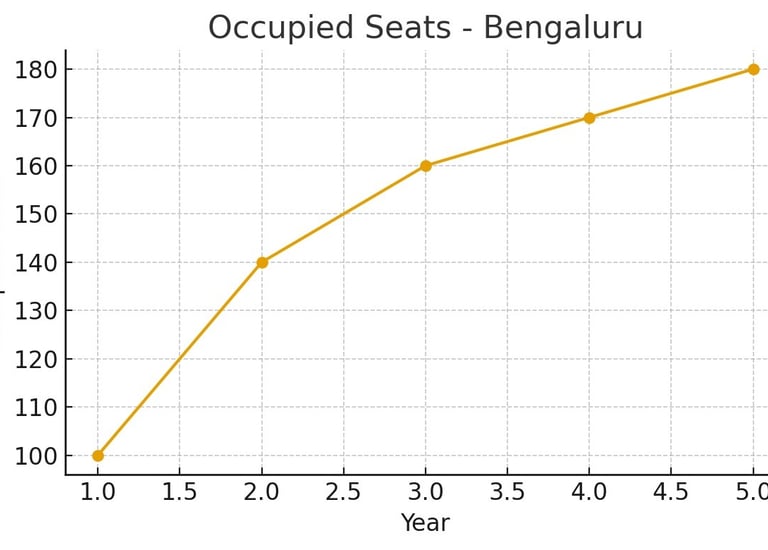Invest in Co-Working spaces
Why now is the right time: Co-working is growing fast, offers stable demand, and provides investors with safer, future-ready returns.
Why invest in Co-Workings?
The Indian flexible / co-working market is growing rapidly (high single-digit to mid-teens CAGR across sources). Supply of flexible workspace in the top metros is expanding sharply (ICRA / industry reports expect supply to rise materially by 2027). Demand is driven by hybrid working, GCC/tech expansions, startups & SMBs, and corporates using flexible space for agility. At a center level, operators have reported healthy IRRs historically; industry analysts expect stabilized investor returns (IRR) in the ~20–25% range once the market matures, while some center-level returns have been higher (30–35%) during early growth phases.


Co-Working have shown amazing growth
Bengaluru
Why it matters: Bengaluru is India’s largest tech/startup hub and hosts a high concentration of Global Capability Centres (GCCs) and startups — positive for flex-office demand. Reports show Bengaluru among the top APAC markets by flexible workspace stock (largest in India). Uptake of flex spaces and large office leasing rose notably in recent quarters.
What to watch: HSR, Koramangala, Indiranagar, Outer Ring Road/Jayanagar for supply/demand. Corporate flight to hybrid models keeps demand strong for premium managed spaces.
Pune
Growth signals: Pune has seen strong Grade-A office leasing and growing startup/IT demand — leasing activity and flexible-office demand rose in recent years with Pune becoming a faster growing second/third office market. Expect spillover demand as companies expand beyond Mumbai/Bengaluru.
Hyderabad
Growth signals: Hyderabad has become a fast-growing office market (GCCs, IT/tech, pharma). Knight Frank and market commentary note rising take-up of flexible spaces and an increasing share of flexible workspace stock among top Indian metros.


Upside of investing in co-working offices
Strong secular demand drivers — hybrid work, startups, GCC expansion, and SMB hiring create recurring demand for flexible leases.
Higher rental yields vs. traditional office — flexible offices typically command premium effective rents per sq.ft (dynamic pricing, short-term premium) and multiple revenue streams (dedicated desks, meeting rooms, events). Analysts cite healthy rental yields and occupancy metrics (sustained 70–80%+ in many centers).
Portfolio diversification & demand resilience — multi-tenant income reduces single tenant concentration risk vs. leasing to a single corporate.
Exit routes improving — larger operators IPOing and REIT interest in commercial assets make liquidity/exit easier (operator takeouts, platform sales, or listing). Smartworks and other players have pursued IPOs recently, illustrating investor interest.
Operational leverage & unit economics — once fit-out and core OPEX are covered, incremental revenue (extra seats, events) improves margins. Early center-level returns have been very attractive.


Due-diligence checklist done by us
Market & location
Catchment analysis: number of target companies, universities, incubators, and transport connectivity within 1–3 km.
Competing supply pipeline: planned/co-working supply in same micro-market. (ICRA / local brokers).


Lease & legal
Lease length, escalations, break clauses, sub-leasing permissions.
Who bears fit-out cost? Any cap on security deposit? Transferability of lease.
Local permits/compliance (fire, safety, signage, GST treatment).
Operator / management
If leasing to an operator: operator track record, occupancy across portfolio, unit economics, client retention metrics, corporate clients & concentration.
If self-operating: sales pipeline, CRM, pricing strategy, community/team capabilities.
Frequently Asked Questions
What is co-working space?
Co-working space is a shared workplace that promotes collaboration, networking, and flexibility for businesses and freelancers.
How is the market growth?
The co-working market in India is growing rapidly, driven by startups, freelancers, and the need for flexible work environments.
What is the expected ROI?
Investors can expect a potential ROI based on occupancy rates and rental income from co-working spaces in prime locations.
How to contact us?
Please use the contact form available on the website for any inquiries or further information.
Why invest in co-working?
Investing in co-working spaces taps into a growing market and offers diversification in your investment portfolio.
What are investment options?
Various investment options include equity stakes, fixed returns, and revenue sharing models tailored to investor preferences.